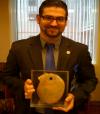Have Swollen Legs And Unable To Walk. Diagnosed With Gout. What Is The Cause And Treatment?

Question: My son just told me that the ER doctor adviced him that might have gout. What is gout and what is the cure? Not sure if that's how you spell it. He said his legs were very swollen and it was very hard for him to walk. He was told to stay in bed for 2 days. What is the treatment, and will he be able to go back to work?
Dear mother,
Thanks for your concerns. Gout refers to the deposition of uric acid crystals in the joints; under the microscope, these crystals look like needles and the protective cells of the body try to "eat them", causing an intense inflammatory reaction. The mainstays of treatment in the acute phase is rest, antiinflammatory medications from the family of ibuprophen (eg. Motrin) for a few days; to prevent recurrences, after the attack is over, patients need a low protein, no alcohol diet and usually a preventive medication called allopurinol. Usually, with therapy most attacks subside in less than 7 days.
Yours truly,
Dr Brenes-Salazar MD
Cardiology
Mayo Clinic MN
Thanks for your concerns. Gout refers to the deposition of uric acid crystals in the joints; under the microscope, these crystals look like needles and the protective cells of the body try to "eat them", causing an intense inflammatory reaction. The mainstays of treatment in the acute phase is rest, antiinflammatory medications from the family of ibuprophen (eg. Motrin) for a few days; to prevent recurrences, after the attack is over, patients need a low protein, no alcohol diet and usually a preventive medication called allopurinol. Usually, with therapy most attacks subside in less than 7 days.
Yours truly,
Dr Brenes-Salazar MD
Cardiology
Mayo Clinic MN
Note: For further follow up on related General & Family Physician Click here.
Above answer was peer-reviewed by :
Dr. Chakravarthy Mazumdar

Answered by

Get personalised answers from verified doctor in minutes across 80+ specialties



